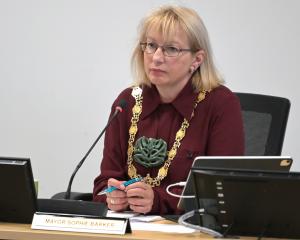
At present, the regional council controls planning and tendering for the buses as well as providing marketing and information. The territorial councils look after the likes of bus stops and shelters.
The letter does not say — as has been the thrust in the past — that the councils should take charge, although that might be implied. Instead, it says: "We need to have greater integration between management of the road network and public transport now.
"We do not believe that the current arrangement of split transport responsibilities can deliver the scale or speed of change that is needed. The time is right to consider how full integration would best be achieved."
The mayors say they have not predetermined what the solution would be but that it would be different from what occurs now.
While regional council chairman Andrew Noone said he welcomed discussions about services, the city and regional council have been down this road before. And nothing substantive has changed.
When local government was reorganised in 1989 and the regional council came into existence, the city owned the major urban bus company Citibus. It was also argued the regional council could take a wider provincial overview of transport. Also included is the total mobility scheme, where taxi fares are subsidised for the disabled.
Nevertheless, the arguments are growing for territorial control. After all, the contracting out and overall direction of Invercargill’s buses is from its city council.
In Christchurch, however, Environment Canterbury is in charge. The urban sprawl into surrounding districts is one good reason the buses are not under the city council.
Mr Hawkins has been vocal for several years. In particular, he is beating the environmental drum. He and Mr Boult say The Shaping Future Dunedin Transport and Wakatipu Way to Go programmes rely on significant mode shifts, making increasingly urgent the need for public transport to be fully integrated with the wider transport network.
The regional council’s record on the buses has been patchy. It has had a history of a strong concern for limiting the cost to ratepayers, an important attitude when it is often all too easy for public bodies to spend other people’s money.
It has, though, been slow to move at times and has seldom been innovative. It took a very long time, for example, for its promise of real-time tracking of buses to be realised.
The bus hub has bedded in reasonably. Flat fares and Bee cards have been improvements.
Sceptics, naturally, might wonder whether the city council would have been any better, especially given the issues with some of the bus stops. The city would be setting itself up for another area of criticism and for larger rate demands as costs would be transferred to it.
There are options like park-and-ride and city-loop buses that might be further investigated. Unfortunately, in a small and spread-out city like Dunedin, the economics and use of most bus routes are and always will be poor.
When Invercargill tried a loop option, it had to be abandoned after failing to generate sufficient patronage and revenue.
The funding model has been about 50% from fares, about a quarter from rates and a quarter from Waka Kotahi NZ Transport Agency (fuel taxes and road-user charges). The Government recently threw in another quarter when it halved fares.
Even free fares, however, will not overcome perceived drawbacks. Many Dunedin residents back the convenience of private cars. Some even believe the grossly common unfair image of buses being just for the young and "losers".
Whatever the challenges, there is merit in a better model and better transport integration in Dunedin and Queenstown.
Comments
As one of the "losers" who took the bus years ago i was struck by there being no bus shelters. Then there were some poorly designed shelters which tall pedestrians could hit there heads on. Now there are some modern shelters at stops so badly conceived the Drivers refuse to use them. Funding has seen the tendering process as a race to the bottom leaving only one foreign owned company. A bus driver i knew lost his job after a year long consideration from NZTA for the crime of getting some speed camera fines in his private car which resulted in no demerit points on his license but put him on the dole. The whole public transport issue in the south has been so badly mishandled one cannot think those responsible have the answers or they would have instigated them long ago. I dont think any of these people have actually taken the bus as they should be made too. Then they would find out about how the timetables are never updated or disused stops are never sign posted as such leaving you waiting for something that is not coming. Much like competent management of our public transport.












